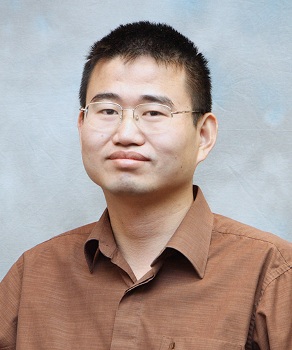Feb 26 2013
For most people, the technical aspects of quantum physics – the behavior of matter and energy on scales as small as an atom or an electron – are enough to make their eyes glaze over.
 Dr. Chuanwei Zhang
Dr. Chuanwei Zhang
But the emerging scientific field of quantum topological materials might be as easy to visualize as a glazed doughnut.
“In this field of research, we are trying to find new materials that are, from a physics standpoint, protected by their topology,” explained Dr. Chuanwei Zhang, associate professor of physics at The University of Texas at Dallas. He is one of the organizers of a scientific conference on the topology of quantum matter to be held on campus this month.
“For example, a coffee cup and a glazed doughnut have very different shapes, but they have the same topology because they each have only one hole. For the cup, this is formed by the attached handle, and for the doughnut, it’s the hole through the center,” Zhang said.
If these objects are stretched, twisted or deformed, their topology remains intact, or “protected,” as long as they maintain their one hole. Break off the cup’s handle or bite through to the doughnut’s center, however, and the topology is broken.
Zhang and his colleagues on campus and worldwide are looking for new materials with a similar type of protected topology under extreme conditions, such as extremely small (or nanoscale) and extremely cold (a billion times colder than room temperature.)
“As long as the topology of such materials remains intact – no matter how much they are deformed – the topological physics of the materials remains the same. If you break the topology, the material’s physical behavior and pattern of electron flow changes as well,” Zhang said. The science is a bit more complex than coffee and doughnuts, however. In this research, “topology” has more to do with how electrons or atoms flow through a material than its actual shape. In other words, Zhang said, the topological nature of these novel materials protects the flow of electrons.
Understanding the physics of topological quantum materials is critically important to the development of next-generation devices, such as ultra-fast quantum computers. Although none have yet been built, large-scale quantum computers would be able to store more information and solve certain problems much faster than current computers.
“Researchers are now trying to use quantum topology to design devices that are protected by certain physical principles,” said Zhang, who joined the UT Dallas faculty last fall. “When used in quantum computers, protected materials would be shielded from ‘noise’ in the environment that could affect performance.”
On Feb. 25 and 26, some of the world’s leading experts in quantum topological materials will gather on the UT Dallas campus for the Symposium on Novel Topological Quantum Matter. The scientific conference is sponsored by the U.S. Army Research Office, the Joint Quantum Institute at the University of Maryland, and UT Dallas’ School of Natural Sciences and Mathematics.
Sixteen invited speakers are scheduled to give technical talks, representing academic institutions such as Princeton, Rice, MIT, CalTech, Purdue, the University of Maryland, the University of Michigan and the University of California, Berkeley. In addition, speakers will attend from the University of Hamburg (Germany), the University of Cambridge (U.K.), and Tsinghua University and Shanxi University (China).
“This symposium brings together many of the most noted theorists and experimentalists in quantum topological materials,” Zhang said. “Having them all on our campus at the same time provides an opportunity to better pin down what future directions research in this emerging science will take.
“As someone who is developing a research program in this field, and as a UT Dallas faculty member, it’s gratifying to me that UT Dallas is helping to pave the way in a very new scientific discipline.”
Dr. Bruce Novak, dean of the School of Natural Sciences and Mathematics, said hosting such scientific conferences reinforces the role UT Dallas researchers play in emerging fields.
“Throughout history mankind has explored,” Novak said. “Yesterday it was mountain peaks and ocean depths. Today, we are exploring the tiniest of spaces, where the laws governing our day-to-day experiences are put on hold and the abstractions necessary to describe these new laws are beyond us. We warmly welcome this cohort of explorers and their commitment to illuminating this new frontier.”